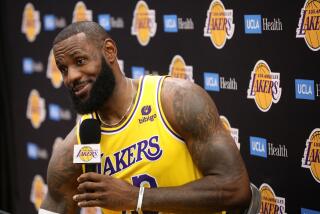For No. 23, 40 is Just a Number
There are occasions when Michael Jordan can still score more than his age, and there are occasions when he can barely bend down to pick up a basketball, when he has to be iced, rubbed, and practically electrocuted to get his body ready to play. How apt that Jordan’s 40th birthday arrived with a record blast from nature, a forced pause when most area games were canceled. “Ironic,” is what Charles Barkley called it.
Everybody is 40 sooner or later, and Jordan is no exception, though we half expected that he would stick at 39. Forty is generally a tolerable age if you have the right pills, a decent pair of reading glasses in every room, and a bottle of calcium supplements. In that respect, Jordan’s version of 40 is not so different than ours: He’s all right with it as long as he’s got electro-stim treatments.
But there is no denying that Jordan’s 40 is as important as it is common.
Whether you view Jordan’s performance with the Wizards as the desperate experiment of a bored man balking at retirement, or the swooping end to a supernova of record duration, his career longevity raises interesting questions about age and ageism. Consider:
Jordan is an NBA all-star at 40, while Martina Hingis says she is done at 23. In fact, Jordan has gone on for so long that he has even outlasted the next Jordan: Grant Hill can barely walk. He’s still playing even as we’ve identified an 18-year-old, LeBron James, as the next, next Jordan. He’s still here in a fast-forward era in which something is already old if it isn’t brand new, and we’re already looking for the next LeBron James.
So what does it mean that Jordan is still playing at 40? It means that nothing is certain when it comes to age, and it’s more often than not a false barrier. Age is not a cliff that a person or an athlete falls off, and in fact, our perceptions of age and what’s reasonable change all the time. The human medieval lifespan, for instance, was 33. Pigeons lived longer.
Whatever you may think of Jordan’s uneven performance this season -- twice scoring 40 or more and on other nights barely mustering double figures -- he has almost single-handedly normalized the concept of athletes playing into their 40s. Two years ago his decision to return to the court was viewed as wishful egotism. Now he’s at the forefront of an important gray panther athletic movement, along with Jerry Rice of the Oakland Raiders, or John Stockton and Karl Malone of the Utah Jazz.
“Forty years old, it’s a number that says a lot,” Jordan said. “I’m well experienced. I’m happy to be alive and playing the game of basketball. I’m happy to be 40. There’s nothing negative about that.”
The fact is that aging is one of the great natural mysteries: scientists can’t explain it. They don’t know why we age, and they only sort of know how we age, and they most especially don’t know why some people and things age faster than others. The oldest known creature is a 220-year-old arctic clam, and then there is a 177-year-old tortoise named Harriet. We don’t know why some creatures age slowly and others age quickly. Why do inchworms go on forever, while grasshoppers live a lifetime in one summer?.
We don’t really know why a whippoorwill lives two years, while a bald eagle lives 20, why a minnow lives three years and a catfish for three decades. All we know are some general rules: smaller species tend to have shorter life expectancies, and creatures with slower metabolisms tend to live longer than animals with fast ones. But not always.
An athlete’s career lifespan is an especially mysterious thing. It’s an idiot savant’s existence, simultaneously accelerated and decelerated, a matter of severe occupational hazard alternating with caressing and extravagant compensation. “Any time I see old jocks, they can’t walk,” Barkley said. “But it’s such a great life, you’d never trade it, either.”
Retirement for them is in some ways more fraught; try finding a second career at 40 as gratifying as sinking a game-winner before 24,000. “I think the hardest thing is, you’ve got to find something to do,” Barkley said, “because you can only play so much golf, and go to so many business meetings; you’ve got to find something you like. I don’t think he’s found that yet. No, I do not.”
So what can we say for certain about the aging of Michael Jordan, and how it relates to our own? We can say this much: He will get older. He won’t be immune from failing eyesight, paunchiness, arthritis, hypertension or some other ill, either.
But his 40s will be easier than some people’s if for no other reason than this: A study of 1,100 persons older than 50 in Ohio found that a major factor influencing health was occupation. Those who had low-income jobs were in poor health much more frequently than those with middle- or high-income jobs.
Jordan celebrated his birthday with a gala Saturday night at the Ritz-Carlton more befitting a king than a ballplayer. He spent the actual day visiting with friends who got snowed in, like Barkley.
“It’s easy to be 40 when you’ve had his life, or mine,” Barkley said.
More to Read
Go beyond the scoreboard
Get the latest on L.A.'s teams in the daily Sports Report newsletter.
You may occasionally receive promotional content from the Los Angeles Times.










